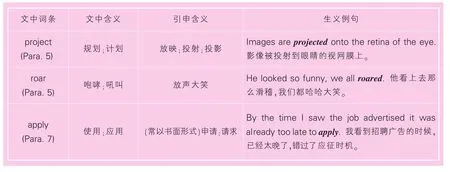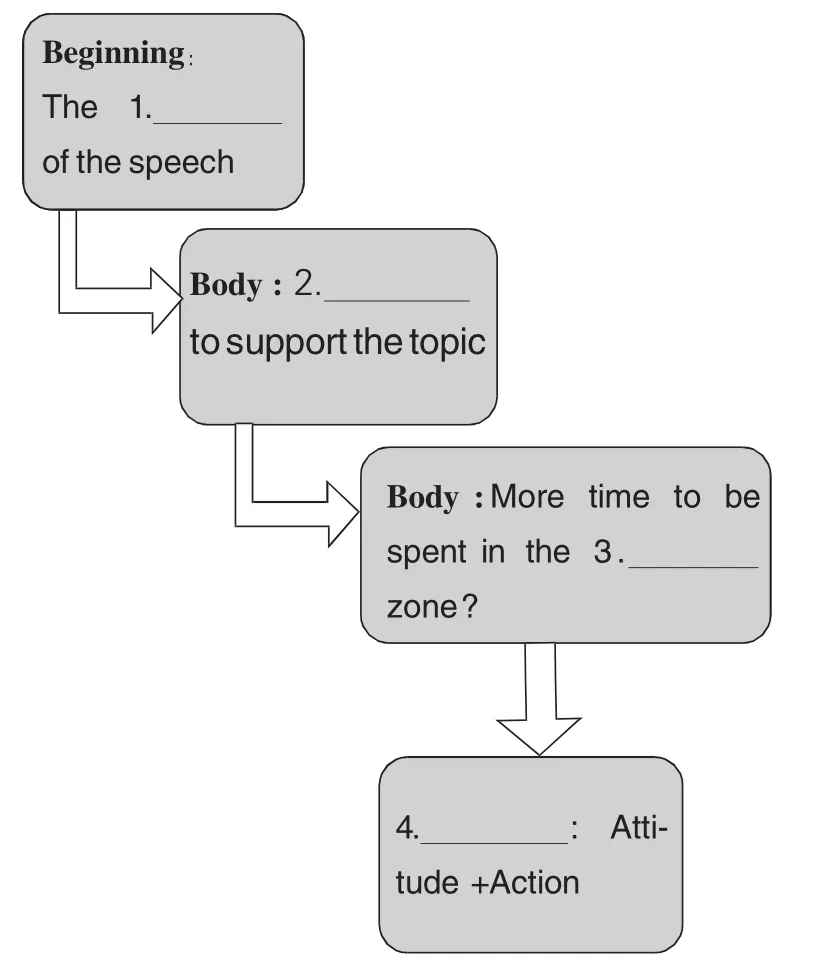How to work more efficiently
2018-09-07演说者EduardoBrice
演说者:Eduardo Briceño
精彩导读
学会关注目标后,还要思考的是同样的学习时间,有人进步速度飞快,有人收获甚微不尽人意。那么,导致背后差异的原因是什么呢?同学们是否知道,我们的学习分为学习区和表现区?如果你想获得成功,必须是学习区的刻意练习,而非把大量时间花在表现区上。在本演讲中,Eduardo告诉我们学习区和表现区,借助具体事例,鼓励我们多把时间花在学习区,以取得稳步的进展。一起来读,一起来思考吧!
阅读立意
1.快读抓住演讲中的主要观点;
2.品悟事例对论点的支撑作用;
3.体会论点间的递进关系;
4.在阅读文本中思考如何提高自己的学习。

Most of us go through life trying to do our best at whatever we do,whether it's our job,family,school or anything else.But some time ago,I realized that I wasn't getting much better at the things I cared most about,and I wasn't improving much at those things even though I was spending a lot of time working hard at them.I'd like to share with you some insights into why that is and what we can all do about it.
They go through life between two zones:the learning zone and the performance zone.Both of these zones should be part of our lives,but being clear about when we want to be in each of them,with what goal,focus and expectations,helps us better perform and better improve.The performance zone maximizes our immediate performance,while the learning zone maximizes our growth and our future performance.
The reason why many of us don't improve much despite our hard work is that we tend to spend almost all of our time in the performance zone.This hinders(阻碍)our growth,and ironically,over the long term,also our performance.
So what does the learning zone look like?Take Demosthenes,a political leader and the greatest orator(演说家)and lawyer in ancient Greece.To become great,he didn't spend all his time just being an oratoror or a lawyer,which would be his performance zone.But instead,he did activities designed for improvement.
Of course,he studied a lot.To speak more clearly,he went through his speeches with stones in his mouth.He built an underground room where he could practice without interruptions and not disturb other people.And since courts at the time were very noisy,he also practiced by the ocean,projecting his voice above the roar of the waves.His activities in the learning zone were very different from his activities in court,his performance zone.In the learning zone,he did what Dr.Anders Ericsson calls deliberate practice.It is this type of practice in the learning zone which leads to substantial improvement,not just time on task performing.We focus all our time on just doing our job,performing,which turns out not to be a great way to improve.
So the way to high performance is to alternate between the learning zone and the performance zone,purposefully building our skills in the learning zone,then applying those skills in the performance zone.
When Beyoncé is on tour,during the concert,she's in her performance zone,but every night when she gets back to the hotel room,she goes right back into her learning zone.She watches a video of the show that just ended.She identifies opportunities for improvement,for herself,her dancers and her camera staff.
And the next morning,everyone receives pages of notes with what to adjust,which they then work on during the day before the next performance.It's a spiral(螺旋形) to ever-increasing capabilities,but we need to know we want to spend time doing both,the more time we spend in the learning zone,the more we'll improve.
So how can we spend more time in the learning zone?First,we must believe and understand that we can improve,what we call a growth mindset.Second,we must want to improve at that particular skill.Third,we must have an idea about how to improve and what we can do to improve.And fourth,we must be in a low-stake situation(低风险情况),because if mistakes are to be expected,then the consequence of making them must not be catastrophic(大灾难的),or even very significant.
Realconfidence isaboutmodeling ongoing learning.Instead of spending our lives doing and performing,we should spend more time exploring,asking,listening,experimenting,reflecting,striving,so that our efforts can become more fruitful,our improvement never-ending and our best even better.Thank you.
阅读扫障
I.熟词生义

Ⅱ.词汇积累
Vocabulary
1.interruption n.the act of interrupting sb/sth and of stopping them from speaking打扰;插嘴;打岔
2.disturb v.to interrupt sb when they are trying to work,sleep,etc.打扰;干扰;妨碍
3.alternate v.to make things or people follow one after the other in a repeated pattern使交替;使轮流
4.purposeful adj.having a useful purpose;acting with a clear aim and with determination有意义的;有目的的;坚毅的;果断的
5.identify v.to recognize sb/sth and be able to say who or what they are确认;认出;鉴定
6.staff n.all the workers employed in an organization considered as a group全体职工;雇员
Phrases
1.go through经历;经受;仔细检查;用完
2.care about对……感兴趣;关心
3.even though即使;纵然
4.share with sb some insights与某人分享一些见解
5.the learning zone and the performance zone学习区和表现区
6.maximize one's immediate performance最大限度地提高某人的即时表现
7.maximize one's growth and one's future performance最大化某人的成长和未来的表现
8.substantial improvement实质性的改进
9.turn out结果是;生产
10.build one's skills培养某人的技能
11.on tour漫游中;周游(巡回)中
Ⅲ.难句分析
The reason why many of us don't improve much despite our hard work is that we tend to spend almost all of our time in the performance zone.尽管我们努力工作,但我们当中的许多人并没有取得多大的进步,原因是我们倾向于把几乎所有的时间都花在表现区。
在以the reason为中心词的定语从句中,若定语从句缺少状语,则关系词用why或for which;若缺少宾语、表语和主语则关系词用that或which。常构成以下句型:
The reason is that...原因是……
The reason why...is that...……的原因是……句式仿写
他缺席的原因是他病了。
多维阅读
Ⅰ.Fast reading(One word for each blank)

Ⅱ.Careful reading
1.How does the lecturer support his opinion?
2.How many ways to do better in the learning zone according to the text?
【点石成金】演讲的文本呈现方式多样。本文属于开门见山,直抒胸臆,首段末句即提出演讲目的。最后一段,通常都是结尾总结,或点题或号召行动,本文也不例外。写作手法,是通过事例来支撑观点。再深入感悟,深悟体会,事例过后,是对如何行动的思考。所以继续谈论的是四种方法精进于学习区。最后落实结尾,提出态度加行动。
Ⅲ.Post reading
1.Offer one more example to support the lecturer's opinion?
2.Pick up useful sentences as many as possible from the passage to get motivated and then share them with your partners.
译文助读
这一辈子,不管是我们的工作事务、家庭琐事、学校任务或是其他,我们大都尽己所能,做到最好。但是一段时间前我意识到,我在最在乎的事情上并没有进步。即使我在这些事上花费了大量时间,做了很多努力,我却没有太多进步。所以我想与大家分享一些,关于它为何发生和如何应对的见解。
他们生活在两个区域之间:学习区和表现区。这两个区域都应该是我们生活的一部分,但是要清楚我们什么时候想要加入其中的一个区域时,我们的目标是什么、精力放在哪、有什么样的期望,这会帮助我们更好地提升和表现。表现区使我们的即时表现最大化,而学习区则使我们的成长和未来的表现最大化。
尽管我们努力工作,但我们当中的许多人并没有取得多大的进步,原因是我们倾向于把几乎所有的时间都花在表现区。这阻碍着我们的进步,更讽刺的是,长久来看,这也影响着我们的表现。
那学习区是什么样的呢?看看古希腊的政治领导者、最伟大的演说家、律师,狄摩西尼吧。为了成就伟大,他没有把所有时间花费在仅仅作为演说家或者律师上,也就是他表现区的一部分。反而,他花时间在为改进学习区而设计的活动上。

当然,他学习了很多。为了发音清晰,他在演说时嘴里含着石头。他还建造了一个地下室,这样他在练习的时候就不会被打扰,也不会打扰到别人。因为那时候的法庭很嘈杂,对此他在海边练习,保证声音在海浪的咆哮中清晰可听。他在学习区所做的行为,和他在法庭上的行为,也就是他表现区的行为,非常不同。在学习区,安德斯·埃里克森博士称这种行为为“刻意练习”。是这种在学习区的练习导致了实质性的改进,而不仅仅是单纯花时间完成任务。我们把所有的时间都集中在做我们的工作和表演上,事实证明并不是一种很好的改进方法。
通往高水平展现的路,就是在学习区、表现区之间交替,我们有目的地在学习区积攒技能,然后将其应用于表现区。
当碧昂丝举办巡回演唱会时,演唱会,就是她的表现区,但是当她每晚回到酒店房间时,她就径直地回到了她的学习区。她会观看刚刚结束的演出录像。为她自己、舞者、摄像组工作人员寻求进步的突破口。
第二天早上,每个人都会收到几页笔记,上面写着他们需要在下次演出前需要调整的问题。提高能力是一个螺旋上升的过程,但是我们需要知道,我们想花时间做这两件事,我们在学习区花的时间越多,我们就会越进步。
那么,我们怎样才能在学习区内花费更多的时间呢?首先,我们必须相信并明白我们可以改进,我们称之为“增长心态”。第二,我们必须提高这方面的技能。 第三,我们必须有一个如何改进和我们可以做什么来改进的想法。第四,我们必须处于低风险的境地,因为如果错误可以预料到,那么错误的后果不一定会是灾难性的,甚至影响深远的。
真正的自信在于建立一个不断学习的模型。我们应该是更多地去探索、询问、倾听、实践、思考和奋斗,而不是把时间耗费在做事、表现上。做到这些,我们的努力会得到更多的回报,我们的进步会一往直前,我们的工作会锦上添花。谢谢大家。
